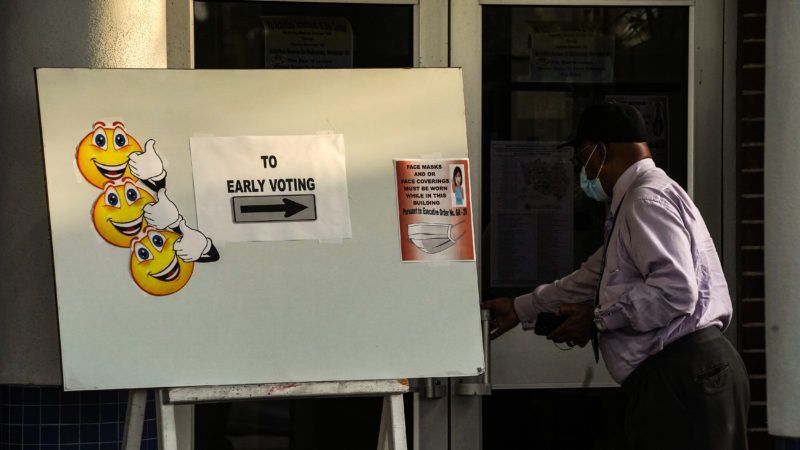In Texas, Wearing the Wrong Thing to the Polls Could Land You in Jail
A new lawsuit says the state's electioneering statutes violate the First Amendment.

When Jillian Ostrewich showed up to vote in the 2018 midterm elections, a pollworker denied her entry. At issue was Ostrewich's shirt, a Houston firefighters tee with union insignia, which was deemed to violate a prohibition on wearing politicized regalia within 100 feet of a polling place. Rules against "electioneering" at the polls are typically understood to restrict signs, posters, and verbal attempts to sway voters, but Texas has laid out a more stringent approach—and running amok of electioneering law there can constitute a criminal offense.
If Ostrewich's outfit choice sounds benign, that's because it was. But one measure on the ballot, Proposition B, was an initiative dealing with firefighter pay. So the "election judge" at Ostrewich's polling place ordered her to turn her shirt inside-out or go home; she felt violated but complied, went to the back of the line, and eventually cast her vote.
"On the merits, the electioneering statutes violate the Free Speech Clause of the First Amendment," argues a suit by the nonprofit Pacific Legal Foundation (PLF). In making her case, Ostrewich's attorneys invoke Minnesota Voters Alliance v. Mansky (2018), a Supreme Court precedent that struck down a similar law in Minnesota. The Texas statutes "are facially unconstitutional under [Minnesota Voters Alliance]," the suit says, "because they do not provide to the tens of thousands of election workers that enforce them any 'objective, workable standards' about 'what may come in [and] what must stay out,' resulting in 'erratic application' of the law."
That erratic application was on full display in Ostrewich's case: A county administrator specifically advised that her union shirt be exempt from any electioneering charges, though that guidance came the day after Ostrewich voted. The t-shirt "did not mention any candidate, measure, or political party, much less take a position," writes PLF. Texas electioneering law also prohibits any clothing bearing a slogan or the name of a past candidate, including those not in Texas and those no longer living.
"I think one of the very troubling aspects of the Texas law is that election judges disagree on what is and what is not electioneering," says Wen Fa, the lead attorney on Ostrewich's suit. "Some judges see Black Lives Matter as electioneering. Others do not. Some people see Second Amendment t-shirts as electioneering. Others do not. Some see Tea Party t-shirts as electioneering. Others do not."
One of the more open-and-shut cases came in 2016, when Brett Mauthe wore a "Make America Great Again" hat paired with a "Basket of Deplorables" shirt, both clearly indicating his support for presidential candidate Donald Trump. Mauthe agreed to remove the hat but refused to turn his shirt inside-out. He was arrested and eventually released on $500 bond, as if he was somehow a danger to the public.
That sort of crackdown is rare; enforcement is typically limited to arguments between clerks and voters. But then, arguments are one of the things the law is supposed to stop. "States are worried about other voters being offended that someone is supporting Trump, or supporting Biden, or supporting whichever other candidates, so they prevent voters from wearing them in the first place," notes Fa. (Fa knows of no evidence that any voter-on-voter confrontations have stemmed from a t-shirt in Texas.)
"If you just ask a person on the street," says Fa, "you would not really think of this as a criminal offense. People have the right to express themselves. They have the right to express their political opinions. And their right to free speech does not stop on election day."


Show Comments (42)